Let's be honest, 2020 hasn't been the best year for planet Earth. With a worldwide pandemic, thousands of job losses, children out of school, economies crashing I think we can all agree, there have been better years. Solidarity group hug over, the world needs us creatives to continue putting out books, poetry, art and creativity. No matter how your year has gone so far, we have a quarter of 2020 left to go. That's three solid months to reach a goal, and Sacha Black and Orna Ross of the Alliance of Independent Authors are here to help you get there. This is how indie authors plan for publishing success.
How Indie Authors Plan for Publishing Success: Permission Mindset
Sacha: When you've had a bad week, a bad month or a bad year, it's easy to let your goals go. To give up and say maybe another time–but inertia is the killer of dreams. Keep striving. That's what's needed but, and here is a big but, you also need to look after yourself. In times of crisis, global or personal, when your world may be turned upside down, it's okay to slow down. It's okay to push things back. It's okay to need headspace and time off.
Whatever you need to keep the creative spark alive is okay.
 I like to keep a post-it note stuck to my computer to remind me that I have permission. It's very easy, even during the good times let alone times of crisis, to forget that this is your life and you are allowed to ask for, and have, the things you need.
I like to keep a post-it note stuck to my computer to remind me that I have permission. It's very easy, even during the good times let alone times of crisis, to forget that this is your life and you are allowed to ask for, and have, the things you need.
We are parents and children and aunts and uncles. We throw ourselves into caring for others to ensure our families and loved ones are okay. That's important. But so are you. You also need looking after, as does your creativity.
So this is a reminder from me to you that you have permission to take that hour of time you need to read in the bath, or write in your car, or stroll into a field… and just be. You have permission to change your deadline. You have permission to move your launch date. You have permission to ask for an extension, you have permission to do whatever you need to do to lower the stress, so you can keep your creativity going.
If your year has been derailed and you know you can't achieve what you wanted with what's left of the year, then narrow your goals. Use Orna's planning method below to understand the most important things you need to do.
Everything else can wait.
When you've given yourself permission to narrow your focus, you'll find you'll be able to work your tighter, more focused, plan and make progress without the guilt of perceived non-achievement hovering over you.
How Indie Authors Plan for Publishing Success: Creative Business Planning
Orna: This post is an invitation to try a particular kind of planning process for your author business, a process based on my personal experience as an indie author, and my observation of thousands of other self-publishing authors over many years.
While there are a number of authors in the indie community who are very business-minded there are a great many more who come to self-publishing with little or no business skills. Conventional society has set up business and literary creativity as if they are something separate, so lots of writers are resistant to being in business at all. I understand this mindset very well. When I started out, it was my own.
I turned to self-publishing more for the creative than the commercial rewards but I wasn't doing it for long when I realized that a self-publishing author has to get to grips with planning, publishing and business tasks effectively. Not enough books get sold because too few readers have heard about them. Not enough writing gets done because you're constantly swamped. And pretty much everything else in life falls apart too.
In those days, I was writing, publishing and marketing books with little to support me, planning wise, than a f-r-e-e-writing notebook and a list of to-dos. I managed to get there, but my book production rate was low, and I was forever chasing myself around.
The to-do list loomed too large in my life. I'd go to sleep ticking off tasks and wake up remembering something I'd forgotten. And I always had a nagging feeling of never getting to the work that was most productive, the most profitable, the most rewarding.
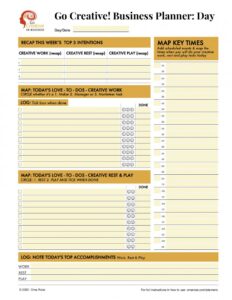
A to-do list works as a planning method only for those writers who have third-party publishers (and other people whose job is straightforward and singular). If all you have to do today, tomorrow, and forever is get words done, drafted and delivered, then a list will serve you just fine. But indie authors are creative directors of an author-publishing business, a much more complex endeavor.
I tried other planning methods but they were too mechanistic for me. I was–still am–a big fan of intuition, spontaneous insights, inspired deviations, and taking the road less traveled. And I know the importance of creative rest and creative play, that they don't take time, but make time.
So I set about putting together a planning method that allowed for all that and–critically–for the tripartite nature of the indie author's job. We're not just writers, we must wear three hats: that of creative maker, manager, and marketeer.
Without a plan that integrates those three–productivity, processes and promotion–we're constantly running behind ourselves. We live with a constant sense of lack: lack of direction, lack of support, lack of resources, lack of time, lack of money.
That's where far too many indie authors find themselves. I know many whose businesses that are in dire straits. They don't pay themselves a salary, they don't have enough money for their tax bill, they are completely disconnected from how much time it takes them to write and publish and reap rewards. They are working hard but from a profit perspective standing still, or barely inching forward. They are stressed, perhaps depressed, perhaps even despairing and about to give up.
Yet all that's needed is the right plan.
It's my experience and my observation that creative business planning is key to ongoing, sustainable success as an indie author. Yes, we can have a flash success here or there but if we don't know how it happened, and don't know how to replicate it, then it falls away as fast as it came.
If you are to earn more money and influence and reader engagement long term, you need a creative business plan that's flexible and focussed enough to sustain you through the inevitable shifts and changes in the self-publishing landscape–and in you.
 How Indie Authors Plan for Publishing Success: Creative Quarters
How Indie Authors Plan for Publishing Success: Creative Quarters
There's a reason conventional business is obsessed with quarters. Quarters work.
Lots of conventional business practices don't translate that well into individually run, digital creative business but planning a year divided into four quarters does.
From a writing or book production point of view, three months (or 12 weeks on and a week off, which is how I now run things) allows you enough time to accomplish a significant creative intention and associated smaller goals. It's not so small that it feels like it makes no difference–but not so big that you disconnect with the endgame.
And a quarter is the perfect length of time for you to experiment with an ad or other promotion method and see does it work for you.
Just like a conventional business, a creative business can hold focus over a quarter in a way that's impossible over a year. Here's how to organize yourself to accomplish something significant in the next quarter.
How Indie Authors Plan for Publishing Success: The Next Quarter
First, define success in your own terms.
So much creative dissatisfaction and angst is generated by authors who are unclear about their definition of success. By definition, we are imaginative creatures and nowhere more than in the nebulous fame and fortune outcomes we imagine for our creative businesses.
We can spend so much time as writers focussing on what we’re writing that we neglect to connect with why we write. We all strive for different outcomes, for different reasons. Establish your own definition(s) of success by f-r-e-e-writing how your definition of success relates to the following: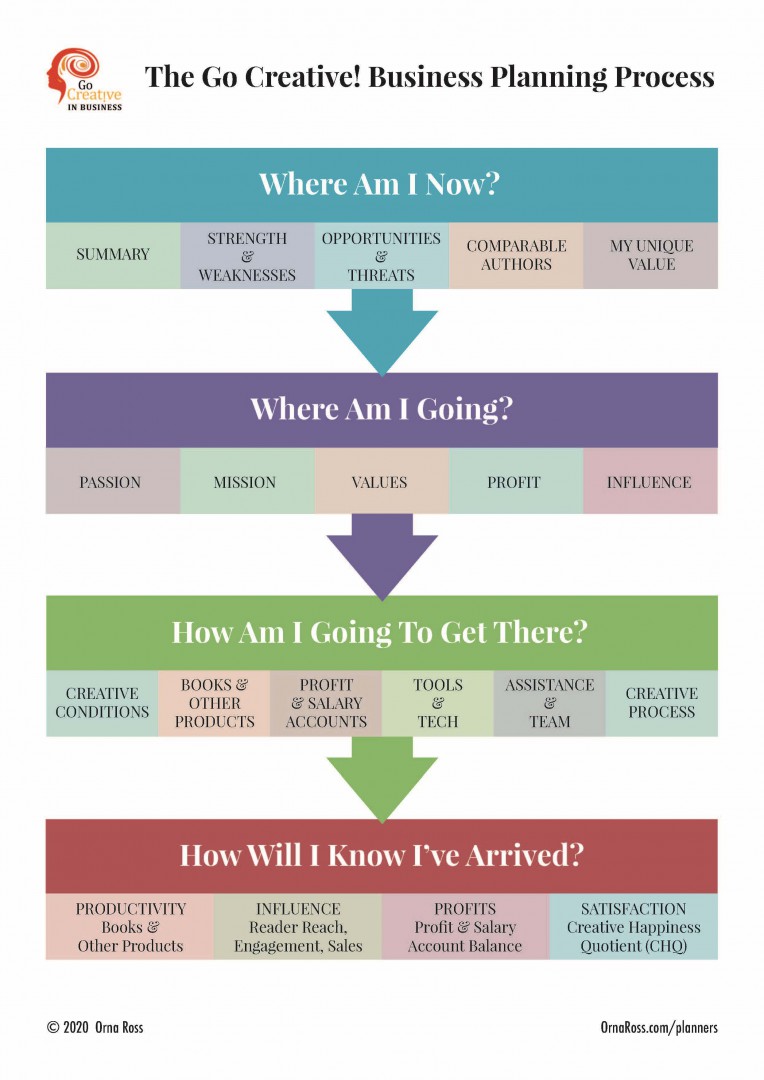
- Inspiring others
- Empowering others
- Educating others
- Entertaining others
- Your own personal growth
- Self-actualization
- Personal freedom
- Having more money
- Having more time
Second, look at where you are now and where you're going.
Your plan for the future begins here and now. So what's going on. Use this Business Planning Process download to consider:
- Where you are now, in terms of the strengths and weaknesses, opportunities and threats your author business is facing. Also what unique value are you bringing to readers? What is it about your books that makes them valuable to another? Finally, if you haven't already, compile a list of comparable authors and start to think about your own work in comparison to theirs–not in any hierarchical way but at the level of offering. What do they offer the engaged reader? How does that compare to your offering? What's not out there that you feel compelled to write? (Hint: this will be connected in some way to your early life experiences).
- Where you're going, in terms of your personal passion, mission and values, and the kind of profit you'd like to make and influence you'd like to have as an author-publisher.
- How you're going to get there. The creative conditions you need, the books and other products you'll create, the bank accounts your sales will feed. The tools and tech and team that will support your business. And your personal creative process: what are the best processes for you to achieve what you want to achieve–in writing, in publishing, in business?
- How you'll know when you've got there. You'll be measuring. The number of books and other products done and delivered. The number of sales you've made, email signups or other reader engagement measures. The amount of money that's accruing in your business bank accounts.
- Enjoying the ride. Your personal satisfaction, your CHQ (creative happiness quotient) is your most important metric. The outer measures of productivity and profit (products, sales, account balances) give us endpoints to travel towards but the inner measure personal satisfaction is what keeps us connected not just to what we’re creating, but how we’re creating. It’s good to have an end in mind but in the end what counts as a creative is how you travel.
Your CHQ is closely aligned to your ability to access the create-state, the state of mind that allows creative flow to happen. Residing in this state keeps you happily productive, even through overwhelming times when you don’t quite know what you’re doing. In flow, you understand that you’re not failing, so long as you carry on embracing your personal, chosen creative challenges. You accept what you have to do to get the job done. You still feel discomfort, yes. Creative happiness is not comfortable or cozy. It’s growth, so you might experience growing pains.
The interesting thing about growing pains is that they’re not actually caused by growth but by overuse (too much running, climbing and jumping can be hard on a child's musculoskeletal system) and a lowered pain threshold. It’s the same with writing and publishing. The pain is not connected to the growth, which in itself feels good, but from trying to do too much, too fast. Or from too low a pain threshold, thinking it should all be easier than it is.
Creative writing, creative publishing, creative business are all complex processes that call for emotional and intellectual labor. That’s what makes them rewarding. Dreaming is easy, wanting is easy, talking about what you could do, or imagining the work done, is easy. But there’s not much payoff. Dreaming and wanting and wishing without accompanying action soon begin to hurt.
Dreamers, wannabes, posers, and pretenders are not happy. They want the reward without the work but it’s the size and complexity of your writing and publishing tasks that make them valuable—to your readers, and to you. Keep your drama for the page, not complaints about how hard it all is. Take the right amount of time for you, time to stretch yourself and enjoy yourself, both together.
I work with a small group of people each month in private workshop if you'd like to take it this planning process further than the space here allows. Go to my Patreon page (scroll down below the poetry tiers to Creative Business Planning)
Thirdly, set up the conditions you need.
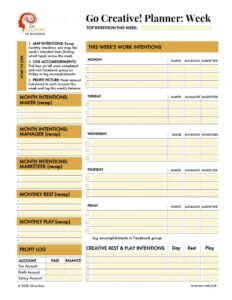 The internet is full of writers counting words and yes, getting our writing done is vital but it's only one strand of success for an indie author, who is a publisher as well as a writer. We need to organize tools, tech and a publishing team (editors, designers, and formatters, assistants) into a cohesive unit that enables us to write and publish well.This means harnessing our own time, resources, and creative conditions optimally. Indie authors must recognize that we wear three hats to get our work done, and know which one we are wearing at a particular time, as they each require us to develop a different set of skills:
The internet is full of writers counting words and yes, getting our writing done is vital but it's only one strand of success for an indie author, who is a publisher as well as a writer. We need to organize tools, tech and a publishing team (editors, designers, and formatters, assistants) into a cohesive unit that enables us to write and publish well.This means harnessing our own time, resources, and creative conditions optimally. Indie authors must recognize that we wear three hats to get our work done, and know which one we are wearing at a particular time, as they each require us to develop a different set of skills:
- Maker (writing words and producing books)
- Manager (improving processes and profits)
- Marketeer (promoting books and other products and projects)
There are many answers to the question: “How Am I Going to Get There?”, as asked in the planning process document. You need to explore and experiment until you find your own personal answer to that question.
This means setting in place the correct creative conditions, the right product ecosystem of books and other products, a banking and financial account system that supports your creative business in the way you need support, as well as the tools, tech and team.
And, most vital of all, an understanding of your own creative process and what you need to nurture it.
How Indie Authors Plan for Publishing Success: Creative Planning Principles
The “Replenish” Principle: Creative Rest
Creative business planning also incorporates intentional creative rest to connect you with your natural bio-rhythms, tap into your subconscious mind, and expand your creative capacity and flow. Creative rest includes: retreat, sleep, meditation, down time vacation, space, quiet. Every year, you should plan for a downtime vacation. Your quarterly and monthly plans should incorporate whole days or weekends spent in peace and quiet, open space with nothing to do. Ideally, every week you should schedule a lazy day, a whole day off, away from all devices, chores, activities, stimulus, reading, devoted to creative replenishment: napping, meditating, mooching. And every day should have some open space, free from other people's noise and interests.
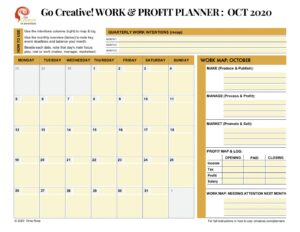
The “Fun, fun, fun” Principle: Creative Play
You're indie because it gives you freedom and flexibility and writing and publishing is your idea of fun. Don't then come down on yourself like the worst kind of boss. Plan to enjoy yourself. Creative play includes create dates, uptime vacation, exercise, side projects, any time spent doing anything that is your idea of fun. Every year, you should plan for an uptime vacation, something stimulating and interesting that gets you moving and grooving. Your quarterly and monthly plans should incorporate whole days or weekends spent in some fun activities, alone. Every week you should schedule a create-date–a few hours spent alone, doing some fun activity that nurtures your inner artist. And every day should have some conscious creative play. Even a few minutes can be immensely nourishing, creatively.
The “One Top Thing” Principle: Creative Work
Whether you are planning a year, a quarter, a month, a week or a day, think in terms of three things you want to accomplish. (Three creative intentions that will take a year to complete, broken into quarterly intentions, monthly intentions, weekly intentions, daily intentions). Draw up creative business maps and plans around these top three intentions. From the three, select the top thing you want to finish first, and resolve to keep at this until you finish. Everything else falls in behind. You'll get to your other intentions but for now, your one top thing has all your attention until done.
The “Let Go” Principle: Creative Focus
Practice delaying, delegating and–most fun of all–deleting other priorities and distractions.
The “Time to Task” Principle: Work in Sprints
Allocate time capsules to your tasks before starting. Work fast, rest and play slow. Note on completion how much time the task actually took.
The “Show Up” Principle: Creative Consistency
Having framed your intentions, do what you said you’d do. Sometimes the unexpected gets in the way, but know you'll show up tomorrow. You've done your plan, no need for any more cogitation. Don't think, just do.
The “Accountability” Principle: Log as well as Map
Allocate a time capsule each week to planning and note the week's accomplishments and the intentions for next week.
The “Connect” Principle: Join other creative business planners
Join our closed Facebook group to map your weekly intentions and log weekly accomplishments with other indie authors
The “Integration” Principle: Balancing roles, modes and mind-states
Use the planners to integrate your work, rest and play, your maker, manager and marketeer, and your money, mission and meaning.
Planning for Success: Monthly Planning Workshops

I run a small-group planning membership on Patreon that provides a monthly live planning workshop. These are not large webinars for thousands of watchers. Places are limited so personal attention is assured at the workshop and in Patreon throughout the month. The workshop is live and also available in replay.
Membership also includes a variety of resources in addition to the workshop, including downloadable pdf planners and worksheets and Facebook accountability group.
Planning for Success: Weekly Accountability Group
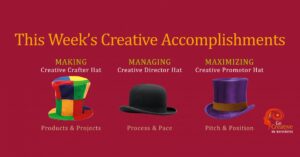 I also run private Facebook group for accountability and support. Each week there on a Monday we map our creative intentions and return at the end of the week to log our actual accomplishments.
I also run private Facebook group for accountability and support. Each week there on a Monday we map our creative intentions and return at the end of the week to log our actual accomplishments.
It's also a place to ask questions and receive help in creative business planning.
Often as authors we resist doing this vital work. Working with a group of supportive others can make all the difference to sustaining success. Everyone in the group identifies with your experience and faces similar challenges.
Join us for support, motivation and accountability.
Planning for Publishing Success in Q4: End of Year Marketing Ideas
Sacha says: The year is not over, far from it. The December period is one of traditional publishing's biggest selling seasons and for those that celebrate Christmas, a huge gift-buying time for books. For those that sell writing craft books, NaNoWriMo is a huge opportunity. And what about Black Friday or Cyber Monday as opportunities to run sales or promotions?
We have a fantastic guide to seasonal selling by Penny Sansevieri which you can find right here. It has a timeline for planning for the seasonal period with stacks of tips and tricks.
Here are a list of quick ideas for boosting your end of year sales:
- Write a seasonal short story or novella in time for Christmas or Hanukkah, Yule or Diwali
- Bundle your books together for a Black Friday, Cyber Monday or Seasonal sale
- Work with other authors to bundle your books together for seasonal sales
- Apply to distributor specific promotions (like Kobo or D2D promotions)
- Apply for a Bookbub or run Bookbub CPM and CPC ads
- Try to organize some podcast interviews
- Run Facebook or Instagram lives on book themes or topics
- Run a giveaway
- Reach out to authors for newsletter swaps
- Apply for newsletter promotions like those run by Written Word Media

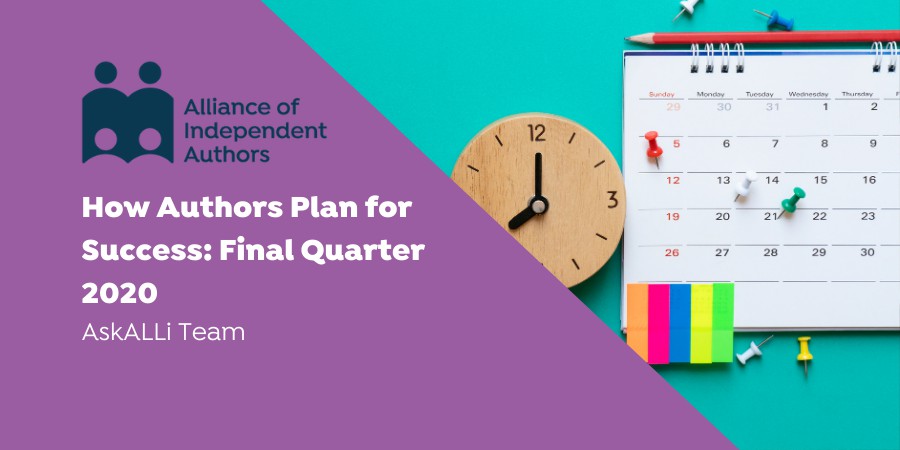
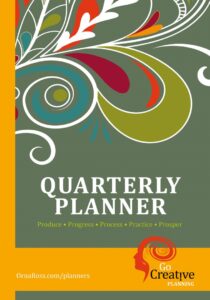
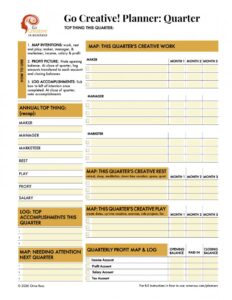



Why people love to use shortened words? It totally destroys conversation…
There are a lot of different mysterious places in this world and I would love to visit any of them.
My dream is to live to the age when VR technology is on the level like in SAO anime.
And how is it relevant today? Things changed so much after all these years.
Damn, I still want to go back to childhood where things were so simple and enjoyable.
After seeing end of GOT, I’m little bit of scared with LOTR series…
I do get tired and I do lose motivation from time to time, but I always come back and I always finish my work
Bought it years ago, I still that it was my best investment.
I hate my work, they blocked browser games and I can no longer enjoy them, they were so awesome…
Awesome article, must be a headache to collect all of this data and list it here, where do you find your sources usually?
I can’t pause the online game, it is not possible. I wonder when our parents will understand that online games can’t be paused…
It’s been a long time, since I have last held in my hands phone with buttons, funny feeling LOL.
Best patch in WoW? Lich King patch was the best, I used to play it all day long and it was an outstanding experience and very warm memories.
Science is moving forward, we are expanding our knowledge and we are achieving new goals. Science is awesome!
Yet another epic article from you, once again on point, and once again useful.
I just joined. I have a complete manuscript of an historical novel. I need an editor, first, then a web site, an ebook, book cover, etc. How do I find the right team on your web site? I need to know how to begin the process– to evaluate editors, to begin with. Can you give me a hint? Thanks!